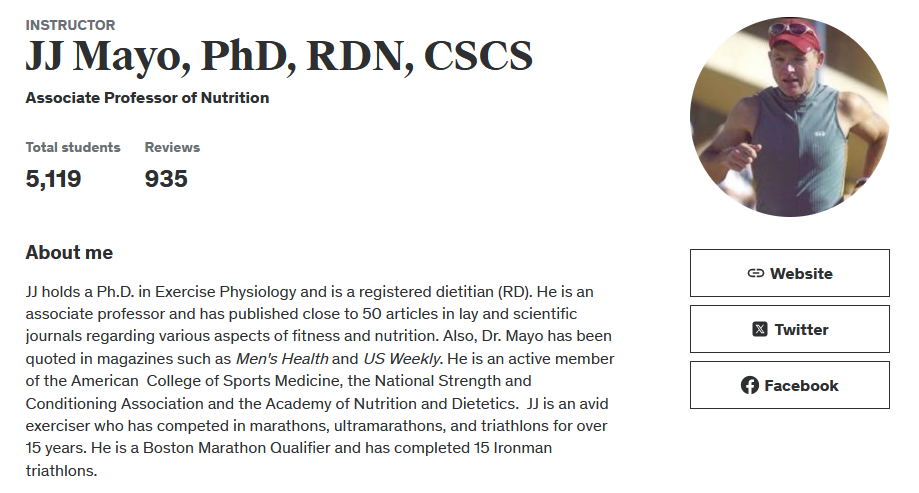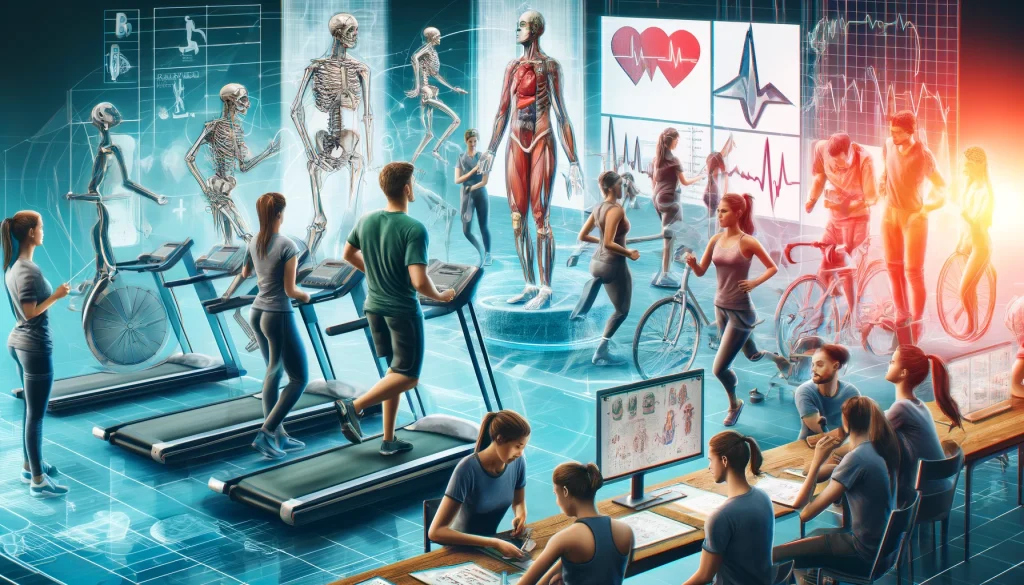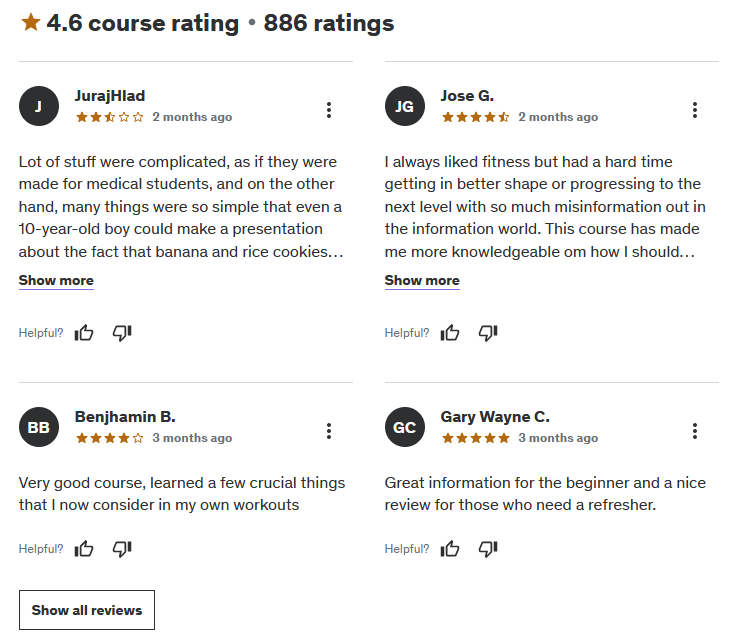Hey fitness enthusiasts and curious minds! Today, we’re diving into a fantastic Udemy course called “Exercise Physiology“. Whether you’re looking to pass those tricky fitness certification exams, currently enrolled in an Exercise Physiology class, or simply want to understand how your body works during exercise, this course is packed with valuable insights. Let’s break it down and see if it’s worth your time.
Instructor Reputation
Let’s take a closer look at Dr. JJ Mayo, the brains behind the “Exercise Physiology” course. With a Ph.D. in Exercise Physiology, Dr. Mayo is not just another fitness enthusiast sharing workout tips—he’s a true expert in the field. His credentials are impressive: he’s a registered dietitian (RDN), a Certified Strength and Conditioning Specialist (CSCS), and an associate professor. This combination of academic rigor and practical experience makes him exceptionally qualified to teach this course.

Dr. Mayo’s career spans various facets of fitness and nutrition. He has published nearly 50 articles in both lay and scientific journals, covering a wide range of topics from the science of muscle function to the latest trends in sports nutrition. His work is often cited by other professionals in the field, underscoring his influence and expertise. Moreover, Dr. Mayo’s insights have been featured in popular magazines like Men’s Health and US Weekly, where he has shared his knowledge with a broader audience.
His involvement with prestigious organizations such as the American College of Sports Medicine, the National Strength and Conditioning Association, and the Academy of Nutrition and Dietetics further cements his standing in the community. These memberships indicate that he is continually updating his knowledge and staying abreast of the latest research and trends in exercise physiology and nutrition.
But Dr. Mayo is not just an academic—he’s also an avid athlete. With over 15 years of experience in competitive endurance sports, including marathons, ultramarathons, and triathlons, he has a wealth of personal experience to draw from. He’s a Boston Marathon Qualifier and has completed 15 Ironman triathlons, showcasing his dedication to fitness and firsthand understanding of the physiological demands of high-level athletic performance.
This blend of academic prowess, professional recognition, and personal experience makes Dr. Mayo an exceptional instructor for the “Exercise Physiology” course. His deep understanding of the subject matter and ability to communicate complex concepts in an accessible way ensure that students are learning from one of the best in the field.
Course Structure
The “Exercise Physiology” course is meticulously structured to provide a comprehensive understanding of how the body responds to exercise. It’s divided into over 40 lessons, which collectively span more than 3 hours of content. This extensive coverage ensures that students receive a well-rounded education in exercise physiology, whether they’re preparing for certification exams, enhancing their academic studies, or simply expanding their fitness knowledge.

The course adopts a systems approach, focusing on the interplay between the muscular, nervous, metabolic, and respiratory systems. This holistic perspective is crucial for understanding how different parts of the body work together during exercise. Dr. Mayo uses a variety of teaching methods to keep the material engaging and accessible. Screencasts are a primary tool, providing visual aids that make complex physiological processes easier to grasp. These are complemented by quizzes at the end of each section, which reinforce key concepts and help students retain the information.
One of the course’s strengths is its emphasis on practical application. For instance, students learn about the three energy systems and how the body converts food into energy. This knowledge is not only fascinating but also highly practical, especially for those looking to optimize their nutrition and training regimes. The course also delves into the structure and function of skeletal muscles, the intricacies of the cardiorespiratory system, and the role of the nervous system in controlling movement.
Nutrition is another critical area covered in the course. Dr. Mayo explains what to eat before, during, and after exercise to maximize performance and recovery. This section is particularly beneficial for fitness enthusiasts who want to understand how their diet impacts their workouts and overall health.
In addition to theoretical knowledge, the course provides insights into practical aspects of fitness training. For example, students learn about the chronic physiological changes that occur in response to regular exercise. This includes adaptations in muscle strength, cardiovascular efficiency, and metabolic function, which are essential for designing effective training programs.
The course is designed to be flexible and accessible, catering to a wide range of learners. Whether you’re a fitness professional studying for certification exams like ACE, ACSM, or NSCA, a student enrolled in a university course, or a fitness enthusiast eager to deepen your understanding of exercise physiology, this course has something to offer. The combination of comprehensive content, engaging teaching methods, and practical applications makes the “Exercise Physiology” course a valuable resource for anyone interested in the science of fitness.
Content Quality
When it comes to content quality, the “Exercise Physiology” course truly shines. Dr. Mayo has meticulously crafted each lesson to ensure that students receive a thorough and engaging education in exercise physiology. The course begins with foundational concepts, making it accessible even for those new to the subject, and gradually builds up to more complex topics, ensuring a comprehensive understanding of how the body functions during exercise.

One of the standout features of this course is its depth of coverage. Dr. Mayo doesn’t just skim the surface—he dives deep into the intricacies of each system involved in exercise. For instance, the sections on skeletal muscle structure and function provide detailed explanations of muscle fiber types, contraction mechanisms, and the roles of tendons and ligaments. This level of detail is invaluable for students preparing for fitness certification exams or those pursuing academic studies in exercise science.
The course also excels in explaining the three energy systems: the phosphagen system, glycolytic system, and oxidative system. Dr. Mayo breaks down complex biochemical processes into understandable segments, making it easier for students to grasp how the body converts food into energy during different types of exercise. This knowledge is not only academically enriching but also practically useful for designing effective training and nutrition plans.
Nutrition is another area where the course content stands out. Dr. Mayo provides comprehensive guidance on what to eat before, during, and after exercise, highlighting the importance of macronutrients and hydration for optimal performance and recovery. This section includes practical tips and strategies that students can immediately apply to their own fitness routines, enhancing the real-world applicability of the course.
The content is presented in a variety of formats to cater to different learning styles. Screencasts with visual aids help illustrate complex concepts, while quizzes at the end of each section reinforce learning and ensure that students have a solid grasp of the material. This multi-modal approach enhances the overall learning experience, making the course both informative and engaging.
Moreover, Dr. Mayo’s expertise and passion for the subject are evident throughout the course. His clear explanations, coupled with real-world examples and anecdotes, bring the material to life. This makes learning about exercise physiology not only educational but also enjoyable. Students can feel confident that they are gaining knowledge from a seasoned professional who has a deep understanding of the field.
Overall Course Rating – 9/10
Let’s get straight to the point: I would rate the “Exercise Physiology” course a solid 9 out of 10. This course stands out in many ways and offers a rich learning experience that few other online courses can match.

Firstly, the course is incredibly comprehensive. With over 40 lessons and more than 3 hours of content, it covers a wide array of topics essential for anyone interested in exercise physiology. Dr. Mayo has structured the course to ensure a logical progression from basic to advanced concepts, making it suitable for both beginners and those with some prior knowledge. This thoughtful structure helps students build a strong foundation before moving on to more complex material.
Another significant strength of this course is the practical application of the knowledge gained. Dr. Mayo not only explains theoretical concepts but also provides practical tips and strategies that students can implement in their fitness routines. For instance, the detailed guidance on nutrition and its impact on exercise performance is invaluable for anyone looking to optimize their diet and training regimen. This practical focus ensures that students can immediately apply what they learn, enhancing the overall value of the course.
The interactive elements, such as quizzes and visual aids, further enrich the learning experience. The quizzes help reinforce key concepts and assess understanding, ensuring that students retain the information long after they complete the course. The visual aids, including diagrams and screencasts, make complex physiological processes more accessible and easier to understand.
Dr. Mayo’s engaging teaching style is another highlight of the course. His passion for the subject and clear, concise explanations make learning about exercise physiology enjoyable and rewarding. He uses real-world examples and personal anecdotes to illustrate key points, bringing the material to life and making it more relatable for students.
The feedback from students who have taken the course is overwhelmingly positive. Many have praised the clarity of explanations, the depth of content, and the practical applications of the knowledge gained. For instance, students like Jose G. and Anthony H. have highlighted how the course has helped them improve their understanding of exercise and nutrition, and how they can apply this knowledge to their fitness routines.
Overall, the “Exercise Physiology” course is an excellent resource for anyone looking to deepen their understanding of how the body works during exercise. Whether you’re preparing for a fitness certification exam, studying for an academic course, or simply looking to enhance your personal fitness knowledge, this course offers valuable insights and practical tips that can help you achieve your goals. The high-quality content, engaging teaching style, and practical focus make it a standout choice in the field of exercise physiology.



